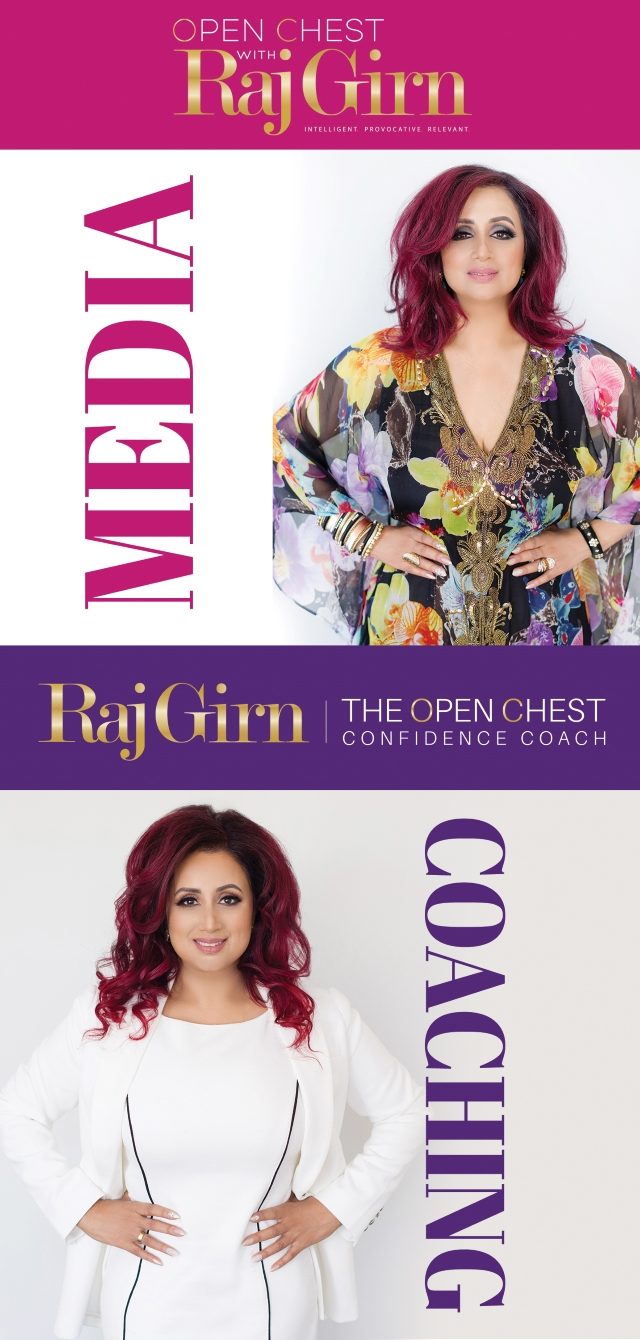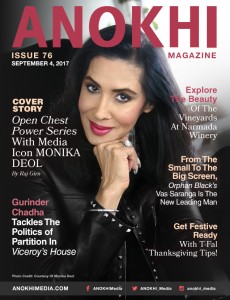 South Asian representation in mainstream North American culture and industry is quite prevalent today. Gone are the days when seeing a brown face on television was an anomaly. We live in an era, now, where the millenials and Gen-Z have many role models to look up to. But that was not always the case.
South Asian representation in mainstream North American culture and industry is quite prevalent today. Gone are the days when seeing a brown face on television was an anomaly. We live in an era, now, where the millenials and Gen-Z have many role models to look up to. But that was not always the case.
Rewind to the end of the previous millenium when the only recognizable South Asians were people like motivational guru Deepak Chopra and news media personalities like Suhana Meharchand and Ian Hanomansing. No one “cool“ existed until the 90s, so the image of South Asians ranging from doctors to taxi drivers remained prevalent until one person stood up and unbeknowing, began a change in the trajectory in North America.
Monika Deol is a name synonymous to the emergence of South Asian pop culture in Canada. She single-handedly pioneered the change of a cliche perception of an entire immigrant identity by facing shows on City and MuchMusic, interchanging between western and eastern garb—something which is still rarely seen today.
When I came to Canada in the early 90s, I was obsessed with this larger-than-life personality who defied the status quo and played with unimaginable odds to stand strong as a serious journalist, a pop culture icon and a proud Indian.
Here is her story, told in the only way it can be—in her own words, as this issue of ANOKHI magazine’s Open Chest Power Series personality. Read on . . .
BEHIND THE VELVET SCENE. . .
You epitomize the immigrant dream, being that you were a self-made brand years before branding was even a thing. Before we break down the mechanisms of how this came into being, I would like to journey back with you to the time when your family moved to Manitoba from Punjab, India, where you were born. There’s nothing written about when you moved to Canada, so assuming that you were old enough to remember this, what was the last memory you have of India as you left and the first memory you have of Canada when you arrived?
I came to Canada as a preschooler, but there are certain flashes of memory about India that I have always had and cherished my whole life. I remember my older sister’s birthday party at the National Defence Academy in Pune, where my father was a teacher. All the little girls in fluffy frocks singing songs in a circle. I remember my first time on stage at my Montessori preschool. The class was singing the song, “There Was a Little Princess“ and I was the princess sitting there in full makeup and my hair out (not in braids). I remember being terrified until I started singing my part and then being very strangely comfortable and happy that I could do it.
I remember being at my buaji‘s house in Ranchi and seeing beggers at the front gate. They told me they were hungry, so I ran to the kitchen and got a pile of chapatis that were being made and gave them to the people at the gate. My buaji was furious and I was upset and angry with her deep down inside, that she didn’t get that that was the only thing to do.
I don’t think I got what was really going on. I recall being very sick on the plane; I always had motion sickness. Thankfully, I grew out of that in my early 20s. I remember going straight to my mamaji’s house in Wawa, Ontario and just feeling so much love and having so much fun with my cousins, who were older and so great with these three little girls from India who had invaded their space.
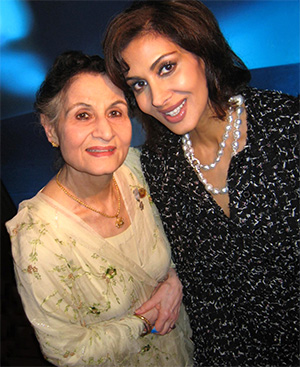
My parents were teachers in India, and they were fortunate enough to get teaching jobs in Canada as part of the immigration process. So, we then moved out on our own to small towns in Northwestern Ontario before moving to a small farm town in Manitoba.
As a young Sikh girl being brought up in rural Manitoba, on a dairy farm no less, I must say that this conjures up a far removed image from that of the public persona we have of you as the host of a multitude of pop culture and news related shows across your long career. I’ve read that you attribute your strong work ethic that built your brand to the discipline that you learned while working on the farm. Tell me a bit about what a typical day was like for you at that time in your life and what it was about this that solidified your staunch work ethic?
Did I mention my parents were teachers in India and fortunate enough to get teaching jobs in Canada? Well, they somehow decided it was better to be your own boss and bought a grain and dairy farm in Manitoba where it can be very cold in the winter. This completely changed our “town kid“ comfortable lives. My family knew nothing about farming and nothing about business.
The whole family woke up at 5:00 a.m. and went straight to the barn. We got the milking machine system ready, cleaned the barn, spread the manure in the field, fed the 100 cows, did all the milking, fed the calves, pigs, chickens, horses, dogs and cats. We ran back to the house at 7:45 a.m., changed clothes, grabbed breakfast and caught the school bus at 8:20 a.m.
We took the bus home from school and had a glass of chocolate milk while our parents watched The Young and the Restless with their tea. At 4:30, it was back to the barn. Every second day, my sister and I cleaned the huge milk tank before everyone else came. Then the same routine as the morning. It was 24/7. Cows don’t take holidays. In there was the expected unexpected things that happened, like cows’ water bowls breaking and flooding the barn, cows having babies, cows being sick and needing a lot of extra care. Machinery breaking down and the barn flooding with manure and, well, just the expected unexpected.
If it was summer vacation, we did the morning routine and then took the tractors and machinery out to the field. You picked a field and a job, and then you drove your tractor all day long doing one of the following depending upon the time of year: plowing, seeding, fertilizing, turning the hay, baling, combining, burning the field, plowing, and, the worst, hauling all the hay bales from the field to the barn.
You learn that lazy is not an option, and how to just get it done. You learn that you are capable of anything; you‘ve lived the hardest life and you survived. You learn that you can learn to do anything.
It’s interesting to me how many South Asian peggers have been successful on the East Coast. But what I find surprising is that you’re the only one who forayed into media, while pretty much all the others hit the political scene. Does this have to do with your teenage ambition in the 80s to be a rockstar, having been in bands and a deejay during these formative years?
I always knew I was going to work around music. I always sang and danced—Indian and Western. I had a band in high school and went to every concert that came to Winnipeg. My parents were a strange juxtaposition of very strict and very liberal, especially for the parents of three daughters. They were always okay with us being into music. Though I think it was intended to be a hobby, not a vocation. For me, it was the only option. No other line of work ever interested me.
What was that pivotal moment that brought you from university in Winnipeg to media in Toronto?
That was a whole lot of moments of God being kind. I moved out of my parents’ house at 17 and have supported myself ever since. So, the call to action to get that career going was an emergency situation and failure was not an option.
While at university, I started a new band and I started volunteering as a club DJ in a Winnipeg club that featured live bands and DJ sets in between. My parents strongly disapproved of me working in a nightclub. But I was a very good, straight kid with self-imposed rules (no drinking, no smoking, no drugs). I thought it was awesome that I was playing music and people were enjoying it. Eventually, the real DJ quit and I was offered the job with pay. Even more awesome.
At university I was pretending I wanted to be a lawyer to make my parents happy. What I was really good at was being PR officer for the International Students Organization on campus. I wasn’t an international student, but my siblings and I loved volunteering and helping kids feel at home. So, I put on cultural fashion shows and organized outings. I never realized that that was my talent—organizing things and, more importantly, connecting with people.
My father passed away and, as you can imagine, everything changed. I realized that this is not a dress rehearsal and you don’t get a second chance. I quit university and started a band that I wanted to take on the road. I had gotten to know the agent who booked the bands at the club. So he signed me on. Then, without telling me, he signed me up for a TV show at the local CTV station in Winnipeg. It was 13 episodes featuring live bands in a local night club. Except he didn’t sign up the band. He said I would host the show. I really did not want to do this. I grew up stuttering and this was my worst nightmare. But frankly, I needed the money, it would be exposure for my band and I would get status with the TV performers union. Plus, it was taped so I could re-do takes, so I did it.
I eventually went to Toronto to shop my demos and hopefully get a record deal. I didn’t get one, but I was offered a TV contract at City TV and MuchMusic.
CANADA’S FIRST SOUTH ASIAN MEDIA PERSONALITY. . .
You’ve been quoted as saying that when you saw the opportunity with City TV and MuchMusic, you seized the moment and never looked back. What was this opportunity that you specifically saw and seized?
When Moses Znaimer offered me an on-air job at this Toronto station I realized that I wasn’t really technically qualified to do this—I hadn’t studied it. But I also realized that I was being given the opportunity to go to broadcasting school through the work itself. It was a lot to learn, but I was working around entertainment and music and I was getting paid. My band was not going anywhere, so I said yes, and just worked and learned as much as I could and went for it!
Did choosing to work at City TV and MuchMusic have anything to do with the fact that these networks were extremely innovated for their time, being that they were programming daily in real time way before social media took over, thus capturing the raw essence of an almost reality tv meets live stream vibe?
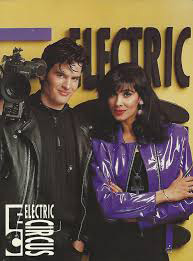
I never wanted to work in television because I thought it was anchorheads and bad hair and corporate. I was an anti-establishment rocker choosing a very different path from the one I was raised to take. But you are right. The second I walked into that building at 299 Queen Street West, I felt strangely comfortable and like I belonged. The energy was jumping off the walls. There were no offices. Just people of every colour, age, gender, etc ., working out in the open, everywhere. I knew I was meant to be there. Growing up in Manitoba, I didn’t even know anything about this station. I had only seen the show The New Music. But I did rush home from the barn to watch it!
As I learned Moses’s philosophy about television, I totally got it, lived it and breathed it. The man is a genius, way before his time. I watched all the big U.S. TV execs at the time, like Barry Diller and Fred Silverman, tour through the station with him and, all of a sudden, the Today show was shot interactive with audiences standing outside the windows and being a part of the show. It was comical how much the U.S. networks copied him. And the industry never gave him the credit he deserved. Moses Znaimer was the architect of all these reality shows today. Early on, he suggested an all-Monika channel where cameras followed me around all the time, streaming live. He thought people would watch and like the reality of my life. I am not making this up. I said no. No way! I already was on national TV, 24/7 literally, between all five shows I did.
How did you come to terms with being an Indian girl playing the mainstream Canadian media scene at a time when no one else from our community even looked at media as a viable career path?
It was tough because I was fighting stereotypes both ways and I started to realize that my rebel stance with my culture was being played out on a very public stage. I didn’t want to be the prime example of why no other young Indians should be choosing a life in entertainment and music. Yet, I have always been very true to myself and just done what I wanted to do, no matter what anyone thinks. So, it was tough. All I could do is be authentic and believe in myself.
I remember in the 90s that the word on the street was that you were Moses Znaimer’s favourite personality of the roster that worked at his networks. What did he share with you that gave you an understanding as to what he saw in you that he felt was special and stood out for him?
The day Moses hired me, he said, “I can teach you how to make good television, but I can’t teach you how to be passionate about where you come from, the politics of society and the world around you.” He just let me be myself. That’s why I wanted to be a rock star—to just be myself. That was magic for me.
I don’t think I was his favourite personality. We didn’t always see eye to eye on creative things, but we respected each other. I think I did five shows at the same time, and I worked really hard to make a contribution to the station. I did learn TV live on-air and it wasn’t always easy. I was a worker bee, not the Queen bee that everyone imagined; well sometimes! I think he appreciated that.
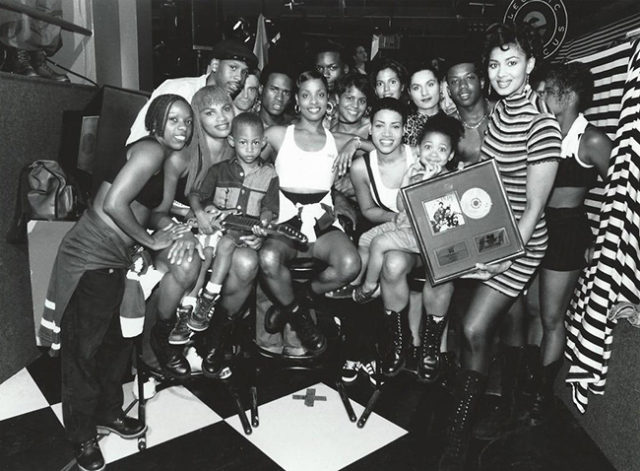
You are most well-known for your on-air personality on a plethora of shows throughout the 90s that included veejaying at Electric Circus to hosting on Ooh La La—very different shows that required different aspects of your persona to bring them to life. Add to this your dual identity. How did you reconcile being Indian and being Canadian in your on-air persona?
I think I have always been true to what I am. I was born in India, raised in Canada and have very strong ties to both parts of me. There are strengths and weaknesses in both and I tried to choose the aspects that I thought were positive in both and be a catalyst for change in what I thought was negative. I’m very comfortable having a dual identity. I think that’s the reality for most people. You just have to understand what you stand for in that realm and then stay true to it.
You personified style at a time before the stylists culture controlled the public image of on-air personalities. Do you think this attributed to your bold expression of mixing your on-air wardrobe choices between mainstream Hip-Hop to Indian traditional garb? I mean girl, you wore a kurta pajama combo on mainstream TV on a pop culture network way before anyone even identified us as a visible minority!
I loved breaking stereotypes and forcing people to think outside of the box. Fashion and makeup were never superficial to me. They are tools that help articulate who you are and what you believe in. I just wanted to be myself and that’s who I am—kurta pajamas and leather dresses. It’s all good!
I knew that, at the time, I wanted to break the stereotypes of all Indians being doctors and cab drivers. I wanted non-Indian viewers to realize that I am an immigrant. I have more in common than they realize with the elderly lady walking down the street in an Indian suit. I am her, and if you like and accept me, you can like and accept her. At the same time, I wanted Indians and non-Indians to realize that we could be glamourous and edgy. That it’s okay for Indian kids to have both sides. There’s a time and a place for everything.
Do you realize the behemoth impact you single-handedly had on an entire generation of South Asians, in that you opened media up as a viable career path, where now, the broadcast scene in Canada is strewn with South Asian representation across all major networks?
I think I was doing what I had to do for the career I wanted. I didn’t set out to be a trailblazer or anything. But, it did slowly become apparent that it was impacting people. In the moment, I just kept doing what I thought was the right thing. I never aspired or claimed to be a role model. I was doing what I wanted to do. But did I feel the pressure? Yes. I didn’t want to mess it up for those coming after me. I didn’t want to be the reason parents would discourage young Indian kids from living their dreams. I also wanted young Indians thinking about it, to know that it was about the work. It’s a business, and you have to have drive and brains.
At this stage in your life, what was succ 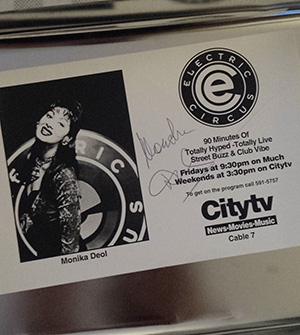 ess for you and did you achieve it?
ess for you and did you achieve it?
At that stage in my life, personal success was being an independant woman. Owning my life, on my terms. Reconciling things about my past, how I grew up and leaving it behind. Making my own way. As a single woman I had my own personal benchmarks—buying my own house, my own nice car, my own great holidays. Not having debt.
Career success was having a demanding career and rocking it. Again, my own benchmarks—hosting New Year’s Eve Live at Toronto City Hall, taking Electric Circus on the road and having 15 to 35 thousand people show up. Being offered hosting and anchoring jobs on major shows in the U.S. Doing five shows at the same time, four of them live. Being a complete workaholic. I loved it.
Yes, I achieved it, personal and career.
Looking back, is there anything you would change up to this point in your life given the chance?
I wouldn’t have sold my house in Toronto!!!!! Just rented it out. Hahahhaha!!! Seriously, no. No regrets.
In the current climate of media, and knowing what you know today, would you still choose a career in media? Explain your answer.
I would not choose a career in media today. The networks are all owned by telecommunications companies. The internet has splintered the audience to a point where television is no longer the star-making machinery. It‘s not the important voice it once was and cannot effect change as it once did. I wanted to change the world in my own small way.
THE MARRIAGE AND MOTHERHOOD. . .
At the height of your unparalleled success, you decided to get married and disappear into oblivion after creating immense brand equity at a time when no one had accomplished such a feat in entertainment media. I remember when the announcement came out, it was a double whammy—leaving a hugely successful career and marrying traditionally. Clearly neither were rash decisions because they changed the course of your life, so can you shed light on how you made the decision that this was the time to shift gears and get married, and that marriage needed (for you) to come with your career taking a backseat?
I always danced to the beat of my own drum. I never cared what anyone else thought. Getting married is traditional. The man I married, and how I got married, was not. I realized that I had met someone who had changed me. I did care what he thought. He made me want to be a better person. He gave me hope that a fulfilling personal life was actually achievable.
I had given my career 110 per cent. I felt that I wanted to give him and building a life together 110 per cent.
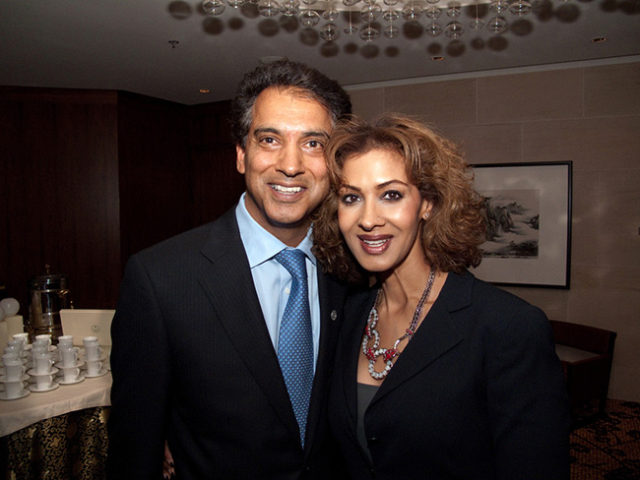
In between pregnancies, you took on news anchor positions in Vancouver where you settled, but nothing ever came before your marriage and motherhood. Shifting your priority from your career to your family was clearly something that you did out of conscious choice. What was the deciding factor for you as to which version of you (career woman versus wife & mother) would take precedent over the other? Was it a simple need to be there for your kids or was it something that went deeper?
I wanted to try and find balance with work and a family life. I was anchoring local news in Vancouver. But I have never been able to find that ‘kind of’ work. And I had the kind of profile that always became sort of larger than life. So, at the time, it made it hard to just be with my kids and hang out and I am incredibly lucky that I could even make the choice to step away. I know that. My husband worked a lot. He was also a workaholic with a consuming career. So, at some point, you have to do what works for your family.
How has motherhood changed how you look at yourself and the world at large?
It changes everything. Just everything. It’s a completely different viewpoint. Too much to get into almost.
I’ve read you saying that as someone who came from a career in the public eye, you have brought up your four kids to be aware of the marketing mindset that media comes with, and to not believe everything they are told, especially in today’s world of over consumptive social media. Can you share your perspectives on how to prepare our kids so that they make informed decisions rather than propaganda-based decisions, and how to be able to tell the difference?
I think we have to teach our children about privacy and manipulation. Privacy is completely undervalued. Pop culture has always been about not being an individual, but being part of the club. I think kids have to understand that there is always a marketing angle in entertainment and social media. So, you should be strong enough to be true to yourself, your family and your values. That’s truly making a statement. That being said, parents have to be strong enough to be the parents. I see too many parents who fall for peer pressure and then they wonder why their kids do what they do. The example starts from you. You do not have to have the things and do the things everyone else is doing. Kids learn it from us!
Your kids range from adulthood to tweens. How do you manage parenting such a wide range of age demographics? I have one 20-year-old and cannot imagine how I would get through a day having to parent more than one child in different phases? What’s your secret sauce?
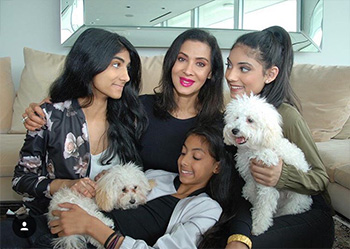 No one has a secret sauce. We’re all just doing the best we can. Just being available to them and trying to support them is important. That doesn’t mean working or not working. No one has perfect children or parents. My goal was to raise strong, contributing, decent people who know how to have fun. Now, they have to make their own life.
No one has a secret sauce. We’re all just doing the best we can. Just being available to them and trying to support them is important. That doesn’t mean working or not working. No one has perfect children or parents. My goal was to raise strong, contributing, decent people who know how to have fun. Now, they have to make their own life.
You were a contributing author to the anthology Between Interruptions: 30 Women Tell The Truth About Motherhood. What is the greatest truth that you have learned about motherhood? It really is unconditional love and that will be put to the test many times. But you literally love your children more than you love anything else. It’s powerful.
Do you feel that you have succeeded in your role as a mother? Or, in hindsight, would you change anything in the way that you parented if you could? And, if so, what would that be and why change it?
I don’t think I’ve succeeded at anything. I have the rest of their lives to get through!
THE BEAUTIFUL COMEBACK. . .
You came back with a bang earlier this year with the launch of a made in Canada beauty brand called STELLAR, which is now available widely across North America’s Sephora stores. First of all, congratulations on such a huge coup and second of all, a two-part question: Why return to the workforce now? And why cosmetics as your leap back?
I have never been able to not work. It’s the farm thing, I swear! My kids are older and still need me, but not in the same way. I wanted to do something for myself and my family. I have done a ton of volunteer work all through raising them, but I wanted to get back to having a career. I want my kids to see that I work and I know how to work. It is important that they realize I have skills and something to offer.
I chose not to go back to television. I wanted something new, where it’s not a slam dunk. I wanted it to be challenged and learning something. At the same time, I need to have passion for something and feel I am making a difference. I was obsessed with two industries throughout my life, as a fan and with the actual business of it. One was the music industry and one was the cosmetics industry.
I feel that the beauty industry has missed a huge part of the market that is an emerging cultural and finacial powerhouse. So, I here I am.
How did you bag the Sephora deal?
It’s a very serendipitous story. A head honcho at Sephora North America headquarters in San Francisco just happened to grow up in Toronto watching MuchMusic and City TV. So, he said he loved Electric Circus and actually took a meeting with me. As crazy as that sounds, it got us in the door. The product got us in the store.
Your sweet spot client is the medium skin tone woman. What does STELLAR bring to this arena that you feel is not already out there? What’s your point of difference?
We actually deliver to all skin tones, but yes, purposefully over-deliver to the medium range. I actually did a lot of research and found that it confirmed what I have thought all along. There simply aren’t enough choices with high performance and accessible price points for medium skin tones. That means Hispanics, Latinas, East and West Indians, Afro-Canadian/Americans, Mediterranean, Middle Eastern, Filipino, First Nations, Chinese, etc. — you know two thirds of the world’s population and the fastest growing demographic in North America.
The reason is undertones. STELLAR doesn’t do shades in the usual light, dark, darker. We stay in a colour and offer a number of undertones in that colour. Our shades are based on real life people and colours, so they tend to match skin colours exactly, more often than not.
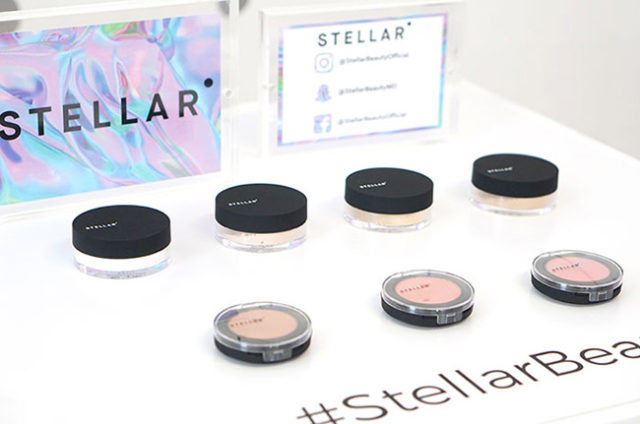
Why the name STELLAR?
I wanted a name that could be said anywhere in the world, with any accent, and people got the meaning as a good thing. Stars are like snowflakes. No two are alike. No two people are alike and I think that’s what makes the world interesting. People have asked me over my career what I think the X-factor is. Having met a lot of notable and interesting people from Beyoncé to Tom Cruise to Bill Clinton, I think it’s sheer energy—a magnetism that makes you watch them. Stars are just great big balls of energy!
The beauty mark or dot in our name represents the North Star. You see it from everywhere. It’s constant and leads the way. That’s what I want STELLAR to be. And, in hindsight, for an independent, family owned, Canadian makeup brand to end up in Sephora America right out of the gate, a lot of stars had to align!
What is your goal with this business?
To serve a need. To serve it well. To be creative, innovative and create a viable business. And to have some fun along the way!
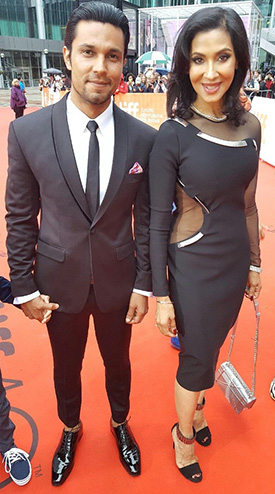 I read that you have your children involved in different parts of your business. Explain in what ways.
I read that you have your children involved in different parts of your business. Explain in what ways.
Their summer jobs for the past three years have been working for me at real jobs that I would have had to hire for. They also provide invaluable insight to their demographic which is everything.
Why is their involvement important to you?
Growing up, my husband and I both worked with our respective families. We went on to have completely independent careers, but that experience shaped us in countless, important ways.
In addition to cosmetics, are there plans to diversify your career path further? And, if so, what do you have up your sleeve that you are willing to share?
Just trying to navigate STELLAR in the North American beauty market right now.
The WOMAN. . .
As a woman who has managed to swing a life just as full in the professional arena as she has in the personal arena and making a come back like the rising of the phoenix in full swing, what advice would you give to women who feel that they cannot have it all?
You can do anything you put your mind to. You have to be brave, self-reliant and not care what anyone else thinks. Do things for the right reasons and then work, really work, to make it a reality. Do your research, question your own motives, check your ego. Be good to people, be kind and be generous of spirit. Karma is everything.
The girl who moved from Manitoba to Toronto and the woman whom you are today, how different are they?
It’s all the same person, just learning and growing and grateful for all the love, affectio
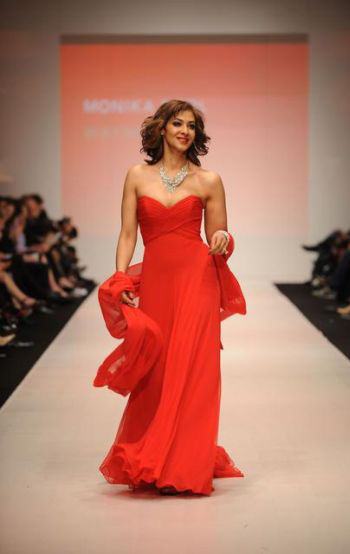
n and faith that people have shown me. It’s been an amazing, wild and sometimes scary ride.
Who is Monika Deol today and is she happy with her lot?
A wife, a mother, a daughter, who is connected to my family and my friends. A business person also, who is still someone who loves music, makeup and having fun! Life is short. I appreciate every minute of it. Yes, I am more than happy with my lot. I love my lot. God has been very kind.
In today’s world of over exposure, what would you say to personal brands that are looking to establish themselves, so they don’t try and be everything to everyone on every platform?
Just have a strong vision. Know why it is your vision, what got you there, and stay true to it. Don’t dilute your value by spreading too thin. Own your own sector and forget about everything else.
The Future. . .
The future is . . . good. It’s unknown, but I’m optimistic.
I have yet to . . . regret my major life choices, and travel to every place on my bucket list.
Motto I live by is . . . trust your instincts. Love your family and friends.
Words to live by! For more on the world of Monika Deol beauty visit http://stellarbeauty.com/.
Main Image Photo Credit: Courtesy of Monika Deol


